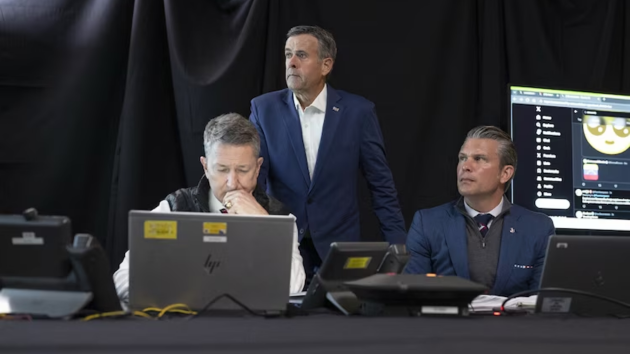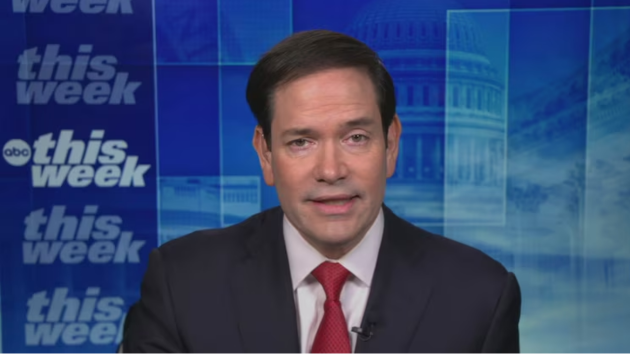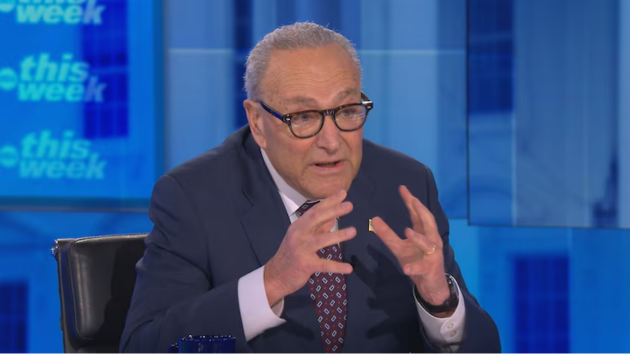3 Black women aim for historic Senate wins in 2024: ‘My intention is to make a difference’
Written by ABC Audio ALL RIGHTS RESERVED on February 25, 2024

(WASHINGTON) — More than 2,000 people have served in the U.S. Senate since it was established in 1789. But just 12 have been Black — and only three have been Black women, none of whom have ever served together.
That could soon change. Rep. Barbara Lee (D-Calif.), Prince George County, Maryland, Executive Angela Alsobrooks and Rep. Lisa Blunt Rochester (D-Del.) are all running for open Senate seats and hope to serve there alongside one another.
“It’s about what we bring, what we bring as Black women, that has never been part of the consistent policy debate in the United States Senate, and it’s time,” Lee told ABC News in a segment that aired Sunday on “This Week.”
In 2017, future Vice President Kamala Harris became just the second Black woman to serve in the Senate, 24 years after the first, Carol Moseley Braun of Illinois, was sworn in.
Last year, following Sen. Dianne Feinstein’s death, California Gov. Gavin Newsom appointed Laphonza Butler, a prominent Democratic advocate and former labor organizer, to serve the remainder of Feinstein’s term.
Lee, who has represented Oakland, California, in the U.S. House since 1998, is running in a very competitive primary for the seat currently held by Butler.
“I have been in the House for many years. But it’s time for me to go to the Senate to be one of 100 because I truly believe that the perspective that I bring, the lens that I bring, is lacking in the United States Senate,” she said.
Lee recalled a conversation with Moseley Braun about the importance of representing all views and experiences in the Senate.
“[Moseley Braun] mentioned certain diseases that are unique to African Americans and people of color, lupus for example, no one would bring these issues up unless you understand them from your background and perspective,” Lee said. “What happens with representation is that not only new ideas, new experiences and new solutions come to the table — but you help strengthen the entire country because we want everyone to be able to participate in this democracy.”
Lee began her political career working for Shirley Chisholm’s 1972 presidential campaign. She credits Chisholm, the first Black woman elected to Congress, with convincing her to register to vote.
“I didn’t believe that the Democrats or Republicans were understanding the needs and the aspirations of myself as a young single mom. And she said, ‘Look, we need your voice. We need you on the inside … we need you to come help shake things up,'” Lee recalled. “I saw how she had to deal with the power structure and how oftentimes everyone was against her. But she stayed the course and she was bold.”
Primary polls show Lee trailing her fellow Democratic Reps. Adam Schiff and Katie Porter and Republican Steve Garvey ahead of the state’s primary on March 5, with only the top two candidates advancing to the general election in the fall.
Asked about the challenges Black women encounter in running for office, Lee said they are frequently systemic.
“When you look at fundraising, for example, we have got to get to public financing of campaigns, we’ve got to overturn [the Supreme Court ruling in] Citizens United and get the ‘dark money’ out of campaigns. Because it’s not a level playing field, when you look at the wealth gap, for example, in the Black community,” Lee said. “The system oftentimes, and that’s one thing Shirley Chisholm reminded me of, it’s not built and made for the participation of certain people who have been shut out for so long. But as Dr. Maya Angelou said, ‘And still we rise,’ and so we have within us the desire and the passion, and the commitment to overcome these obstacles.”
“And that’s what you’ve seen historically, with Black women, overcoming these obstacles and fighting for our democracy,” Lee said.
Lee is perhaps best known as the sole member of Congress to vote against the military authorization for the invasion of Afghanistan, three days after the September 11th attacks. She said at the time that she wanted the country to avoid becoming entangled in a larger cycle of bloodshed.
“I was called a traitor. People were calling my telephone, leaving gun shots on voicemail, it was terrible. I had to have security and the death threats and the threats to my personal safety and my family was overwhelming. However, sometimes when you’re in public life, if you’re a public servant, you know the risks,” Lee said. “You have to be able to withstand the political pressure, and that’s why I want to be in the Senate, because there are gonna be some hard debates and some hard fights in the Senate in the next few years. And in fact, I don’t back down when I know that that’s the right position, even if it goes against my party.”
In Maryland, Alsobrooks is running for the seat held by retiring Sen. Ben Cardin.
“I recognize the power of the federal government, the infrastructure dollars, the health care access that we’ve been working to build here, and I realized how important it is to have individuals in those positions who are fighting hard for the people they represent and who understand them,” Alsobrooks told ABC News.
She is up against Rep. David Trone, D-Md., a wealthy, self-financed candidate in the May 14 primary, but has the endorsement of half of Maryland’s congressional delegation.
If she wins the primary, she could go head-to-head with popular former Republican Gov. Larry Hogan in the general election, who just announced he was entering the race.
Like Lee, Alsobrooks described some of her strengths in terms of her personal background.
“I was the first woman elected as prosecutor here, I was the first woman to be elected as county executive — and what that has meant is that I have brought to bear solutions that are very different, they are based not only on my professional experience but lived experience,” Alsobrooks said. “I think it’s important to have people representing you who live like you, who can think like the people they represent and who understand and share the cares and concerns of the people they represent.”
Alsobrooks has been very close with Vice President Harris ever since they connected in 2010, she said.
“It has been a really wonderful relationship that we have developed,” she said of Harris. “She’s been in many of the spaces before me, if you think about it, as the first-ever [Black woman] district attorney elected in San Francisco, one of the youngest, the same experience that I’ve had here.”
Asked what lessons she’s taken away from Harris, Alsobrooks said, “It is not as important that you’re the first at something, it is that you create the kind of record and create the kind of roadway so that others can be successful too.”
“You are not truly successful until you’ve made someone else successful,” she said.
Blunt Rochester serves alongside Lee in the House. In 2017, she became the first woman and Black person to represent the state of Delaware in Congress.
“I had never run for anything in my life,” Blunt Rochester told ABC News about her decision to launch that original campaign. “I was over 50 when I decided to run, and I had just been widowed… and I said, ‘You know what, I’m still alive, I can still serve and I decided to run for office and in a six week primary, you know, beat five guys.'”
Blunt Rochester is favored to win November’s election. If elected, she would become the first woman and person of color to represent Delaware in the Senate.
“I think about the little girls, I think about those women who have been widowed or who are over 50,” she said. “For me to be able to represent and bring those lived experiences, the professional experiences, the policy issues. I mean, we know that Black women die from childbirth more than their white counterparts [and] have 43% more student loan debt than our white counterparts.”
“I don’t really think about the history so much because, you know, my intention is to make a difference and to have an impact on people’s lives,” Blunt Rochester added, “and should there be a history making moment, that’s great.”
The Delaware congresswoman shares a close relationship with President Joe Biden. She endorsed him the day he launched his White House bid in 2019 and serves as a national co-chair of his reelection campaign.
“When my dad unexpectedly passed away from leukemia, President Biden called when we were all taking care of dad during hospice … He and the first lady came to the visitation at the church for 45 minutes and spent time with us,” Blunt Rochester reflected. “I was holding it all together … But there was something about him, looking at my face, and saying, ‘It’s going to be OK, kid,’ and that just made me lose it. I just fell into his arms crying.”
If just two of these candidates win, they could make even more history, as the Senate has never had multiple Black women serve at the same time.
“I’m very proud of Congresswoman Barbara Lee, I’m very proud of Congresswoman Lisa Blunt Rochester. They are just really dynamic women. They’re warm, they’re purposeful and so it’s been an honor to run in the same year,” Alsobrooks said.
Lee said she’s spoken to both Alsobrooks and Blunt Rochester about the history they could make serving together.
“We say ‘one is not enough’ — all of us need to be elected to the United States Senate,” she said.
Blunt Rochester said working alongside women who share some of her lived experiences “is always a good thing, particularly when times are hard.”
“You think about Shirley Chisholm in this moment, where she said, ‘If they don’t give you a seat at the table, you bring a folding chair,'” Blunt Rochester said. “Well, maybe we’ll have many folding chairs.”
Copyright © 2024, ABC Audio. All rights reserved.

 KVSP
KVSP 




